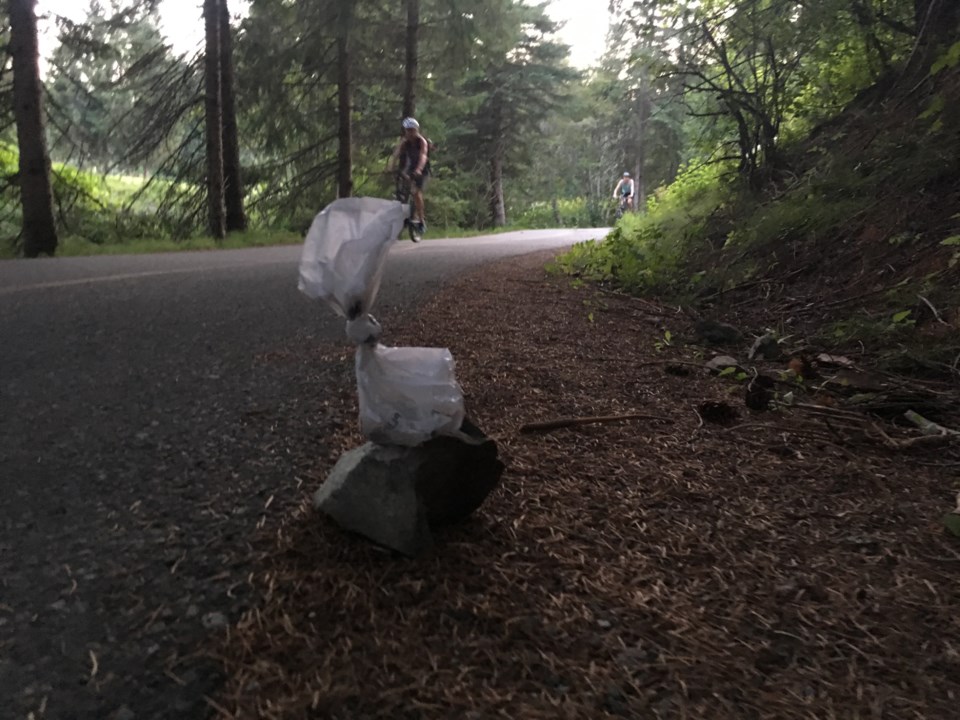As I gaze around Whistler’s latest spate of illegal parking, camping, and the bizarre habit of so many dog owners in plucking up their pet’s poop only to inexplicably drop the bags wherever they choose as if some magic eco-fairy will vaporize them on the spot (newsflash: poop bags don’t decompose quickly behind concrete barriers, on stumps, or hanging in trees, but in the heat of a proper composting facility where they end up when you aren’t too lazy to carry them to a receptacle), I worry about humanity.
I know I’m not alone.
As we perch on the precipice of a second pandemic wave, one whose early numbers—uncontained by either long-term health care or food-processing facilities—promise a worse bout than the last, many British Columbians are rightly wondering what happened. Why has the already-trepidatious prospect of sending kids back to school been turned into a horror? Why are the livelihoods of so many, precarious for so long, again being threatened? How was all the diligent work and sacrifice of some 5 million of us over the course of five months squandered in the blink of an eye by the carelessness of a party-hounding few?
In a word: Entitlement.
While most of us understand its definition—a belief that one is inherently deserving of privileges or special treatment of some kind—fewer grasp how deeply entitlement has permeated the zeitgeist, including such newsworthy touchstones as political polarization, science denialism, and arguments around racism, individual rights, and their intersection. During—perhaps because of—pandemic lockdowns, entitlement, always bubbling beneath our human egalitarian façade, has become epidemic itself, a de facto societal ill on par with the disease seemingly propelling it.
But let’s be clear, entitlement as most practice it (largely without knowing) is an entirely manufactured thing. It does not prescribe a right to do, be, or have something. At best the only entitlement we have as humans, as parents, as dwellers in a particular jurisdiction, is a right to choose what to do, be, or have (or not—on all three counts). And your right to choose always comes with the realities and responsibilities of impacting the rest of us. If we can afford it, for instance, we are entitled to choose to drive a gas-powered car despite knowing its emissions impact the health of others and the planet. But we can also choose to go electric or ride a bike for the same reasons. We’re similarly entitled to choose to work in a demonstrably destructive industry like asbestos mining, oil and gas, or logging, but our choice doesn’t come with an inalienable right to have that job protected by the state at all costs when the harms are seen to outweigh the gains.
Clearly many things we think we’re entitled to come with negative outcomes for others—like climate change, pollution, or a coronavirus pandemic. And what do these have in common? They all disproportionately affect the marginalized, the vulnerable, and the poor; those who are already suffering, already disadvantaged, already oppressed; exacerbating injustice, racism, and poverty.
Back in May, when the U.S. first began its COVID-19 meltdown, media reporting of pushback over the shutdown zeroed in on “malignantly entitled” white women who, screaming at clerks and refusing to leave stores over obligatory mask wearing, became standard-bearers for a bizarre revolt against common-sense safeguards. It seemed the only community many wanted to protect was their own, to live their lives in the same comfortable way as always—the health of others be damned. They were protesting to reopen America not for the right to work as hairdressers, CNN commented, but for the right to have them, the right to drive to whatever closed playground they wanted, and the right to eschew masks as “uncomfortable” and a reminder of how “depressing” the situation was—an entitlement bundled with the rejection of scientific facts.
Professor Katharine Hayhoe, director of the climate institute at Texas Tech University recently tweeted about the environmental entitlement of climate denial: “[It’s not] a stand-alone issue; it’s part of a toxic stew that, today, includes COVID denial. I review profiles of those who attack me… and most include tweets ridiculing masks or claiming [the virus] isn’t serious.”
As late U.S. senator Daniel Patrick Moynihan famously summed up, “You’re entitled to your own opinions, but you’re not entitled to your own facts.”
No one is. Facts stand up to agreed-upon testing procedures. Sometimes these are temporary given the scientific method of continually accruing new knowledge, but again, though you may choose to, you’re neither entitled to, nor have a right to ignore facts and the consequences of a poor choice.
So wear a damn mask… and throw out your dog-poo bags.
Leslie Anthony is a science/environment writer and author who holds a doctorate in connecting the dots.




